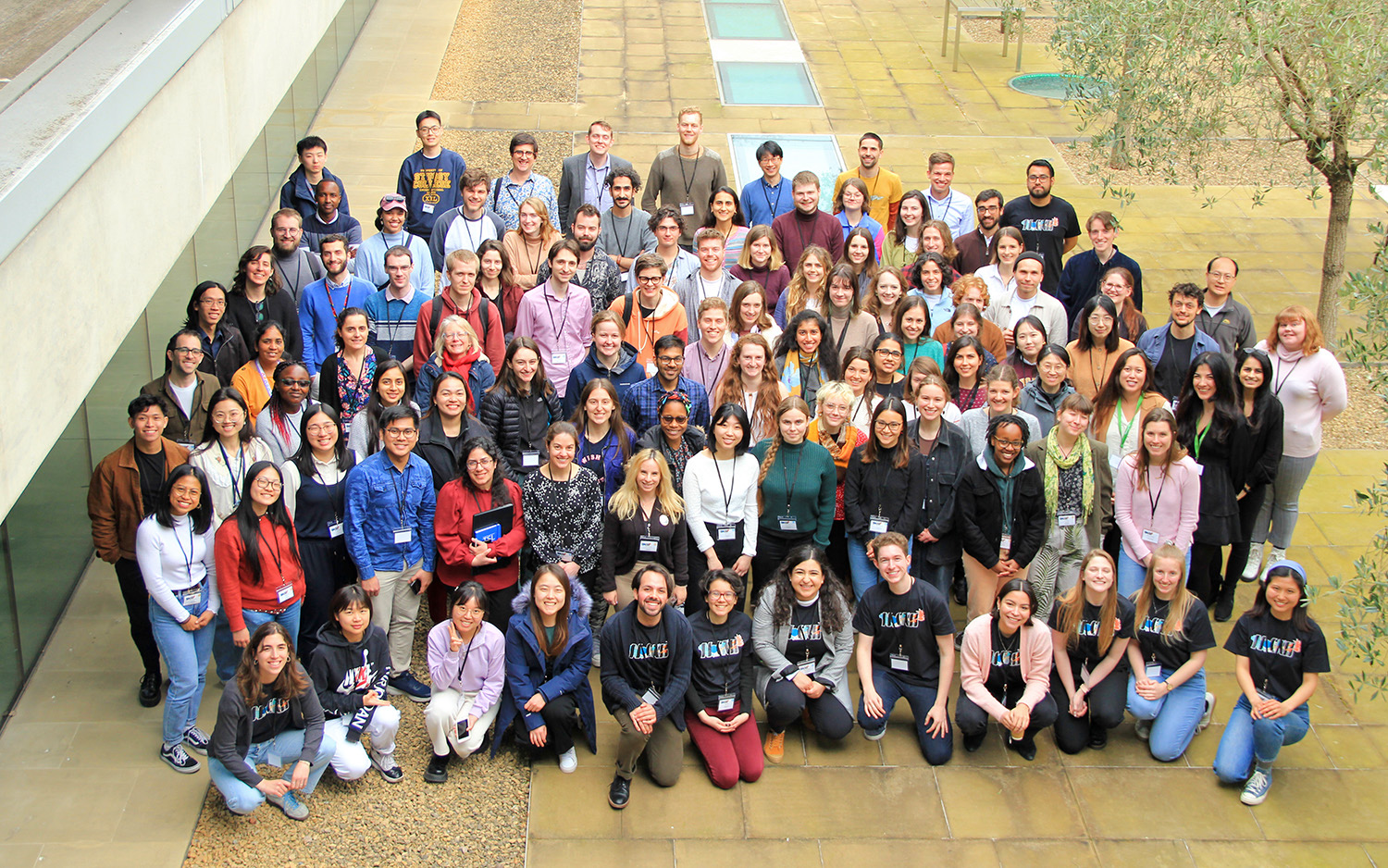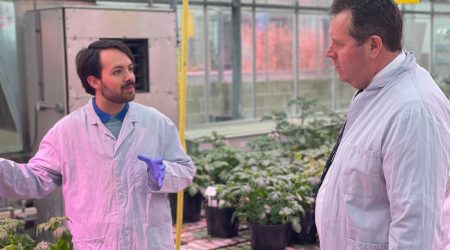NoCaSS: Norwich-Cambridge Science Symposium 2023

On 24-25th April 2023, the Norwich-Cambridge Science Symposium (NoCaSS) was held at the Sainsbury Laboratory, Cambridge (SLCU).
NoCaSS, a student-led symposium, was first held in 2013, and aims to promote communication and collaboration between plant science research students from Norwich and Cambridge.
The conference is hosted on rotation, with Norwich and Cambridge taking turns, and gives students a platform to showcase their work, exchange brilliant ideas and foster meaningful connections from different locations and research disciplines.
Due to the disruption of COVID-19, NoCaSS 2021 was held online, but returned to an in-person conference in Cambridge in 2023.
This year’s NoCaSS was the biggest event so far, a feat achieved through the hard work of Cambridge students, Anna Sze Wai Tse and Farahnoz Khojayori, who reached out to two previous organisers from Norwich, Sebastian Samwald and Jiawen Chen.
Preparation
Lead organiser, Farahnoz gathered volunteers from Cambridge, whilst Jiawen contacted interested students in Norwich. Gradually, a team of 10 people formed the organising committee and included post-doc representatives from both Norwich and Cambridge.
The team worked tirelessly to address the many logistical obstacles that come with organising a conference of this magnitude, and they implement changes such as having post-doc attendees, stretching the event out to two days, and securing additional space when NoCaSS quickly gained popularity and received more attendee sign-ups than was anticipated.
Day One
On 24th April 2023, more than 120 early career researchers arrived at the Sainsbury Laboratory Cambridge University (SLCU). The opening speech was given by Farahnoz and Thomas Navarro, Chair of the JIC Student Voice (JSV). They welcomed the attendees and set the stage. During their speech, they referenced “Seeking Clarity”, by poet Pablo Neruda, which highlights how research is about finding the answer among the darkness.
This inspirational opening was followed by two presentation sessions on the topics of “Virulence” and “Metabolites and Morphogens”. The presentationscovered a broad range of research disciplines, including virology, plant pathology, computational biology, bacteriology, biochemistry, plant natural product biosynthesis and structural biology.
This year, for the first time NoCaSS included three workshops on different aspects of early career research. The first workshop on transferable skills was delivered by Dr Franck Fourniol and Dr Jörg Stange from hfp consulting. This interactive session demonstrated how early-career researchers can self-evaluate their skill sets developed from the academic setup and present them in a structured format for their next career step.
The first day wrapped with an evening of food, socialising and networking, leaving everyone excited for the next day of the conference.
Day Two
The second day began with four excellent talks themed “Development and Evolution”, covering circadian clocks, signalling transduction and floral trait evolution. This provided a fascinating chance to see the similarities and differences between the research carried out in Cambridge and in Norwich.
In the second workshop, two principal investigators, Dr Natasha Yelina (Crop Science Centre, Cambridge) and Dr Tina Schreier (Department of Plant Sciences, Cambridge), along with two research scientists working in industry, Dr Rita Borba (Illumina) and Dr Chiara Airoldi (Abcam), shared their journeys towards a career in either academia or industry.
Discussing the challenges and opportunities that they encountered along the way, the speakers relayed the pros and cons of different career choices and gave helpful advice on applying for positions.
The keynote lecture was given by Dr Megan McDonald from the University of Birmingham. Her talk “Giant transposons driving fungal horizontal gene transfer: the ToxA story” demonstrated Megan’s pioneering research on plant pathogenic fungal genomics.
Megan also shared her journey into science, which was far from ordinary and filled with hard work and perseverance. This left many in the audience feeling deeply connected and made this lecture a special experience.
The final workshop focused on Publishing and Writing. This featured five panellists with different roles in the publishing process: Dr Mary Williams (Senior Features Editor, The Plant Cell and Plant Physiology), Dr Stuart King (Research Culture Manager, eLife), Dr Facundo Romani (Early Career Advisory Group, eLife), Dr Jared B. Fudge (Senior Editor, Nature Biotechnology) and JIC’s own Plantae fellow, Rose McNelly.
Each panellist brought a unique perspective, and the discussion generated useful tips for getting started with writing, such as practising science communication and using plain English.
In the last two talk sessions, the audience heard about research carried out in the fields of “Roots, Fungi and Resistance” or “Genetic Engineering”. Talks explored the complex plant-microbe interactions in relation to plant health, such as developing plant resistance against pathogens and the dynamics in signalling pathways upon interacting with beneficial fungi. The Genetic Engineering talks focused on this cutting-edge technology, from the development of new methodologies to engineering plants with desired traits.
As well as the more than 20 talks given by PhD students and postdocs, there were also approximately 40 poster presentations, including debuts for some first-year students.
At the end of the afternoon, attendees were invited to have a tour at the beautiful Cambridge Botanical Gardens.
Feedback
After the event, the organising committee was pleased to learn that attendees enjoyed NoCaSS 2023.
Organiser of NoCaSS 2021, Jiawen, said: “I was really impressed with how well this conference was organised. All the different sessions ran smoothly, and I liked the focus on both science and professional development. I personally really enjoyed the session on writing and publishing, as I am interested in this as a future career, and I also got to have a good chat with some people from this panel during the conference dinner.
“I was happy that I still got to join, even though I recently had to let go of my student status! The atmosphere was friendly and engaging, and I think it was a good first networking event for many early year students as well.”
The success of NoCaSS 2023 is attributed to a great committee, generous contributions from funders, and everyone who attended the conference. The NoCaSS 2023 committee would like to express their appreciations to Andrew Benton, Digital Communication Coordinator (Department of Plant Sciences, Cambridge), who enthusiastically promoted NoCaSS through various communication channels and took over the photography during the dates; Paige Staff (JIC, Norwich) and Kathy Grube (SLCU, Cambridge), Digital Communications Officers, who supported the social media promotion of NoCaSS.
Many thanks to all who helped throughout the event too.
Future
The next NoCaSS event will return to Norwich. We look forward to seeing you then and a call for the new committee will be launched in early September 2023. Whether you attended NoCaSS 2023 or not, this is a great opportunity for those interested in building their network, planning a scientific event, and bringing their own personal touch to the research community.
Committee – (Cambridge) Emily Oren, Farahnoz Khojayori, Gabriel Ferreras Garrucho, Humberto Herrera-Ubaldo, Lucía Arce Cubas; (Norwich) Hannah Rae Thomas, Marina Millán Blánquez, Rose McNelly, Ruoxi Lin, Thomas Navarro.
Funders – Cambridge Philosophical Society; Department of Plant Sciences, University of Cambridge; eLife; Engineering Biology Interdisciplinary Research Centre (EngBio); Gatsby; Genetics Society; hfp consulting; John Innes Centre; John Innes Foundation; KWS; Molecular Plant; New England Biolabs; New Phytologist; Novogene; Plant Communications.

NoCaSS 2023 group photo



